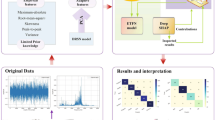Abstract
The technological growth and progressive maturity of digital manufacturing ecosystems in industrial environments have improved the retrieval of information from many devices, hence laying a rich data substrate that allows for manifold possibilities around industrial data. Among them, information collected by sensors deployed over machines has blossomed a vibrant research activity around models for industrial prognosis, i.e. for predicting the remaining useful life and for reducing the downtime of industrial assets. Prognosis is conceived as the first step towards predictive maintenance, which is nowadays of capital importance for the manufacturing industry. Among the different models used for industrial prognosis, in this work we focus on the potential of a particular branch of randomization-based neural networks (Reservoir Computing, RC) to model industrial prognosis as a supervised classification task. Specifically, Echo State Networks (ESN) are under study, since these recurrent models have been used in other modeling problems with time series data. A key ingredient of this work with respect to the state of the art is to showcase that performance results can be further enriched with extended insights about the importance granted by the model to its inputs, due to the lack of algorithmic transparency featured by these models. To this end, we propose a novel perturbation-based method to elicit local explanations that can help the user assess how the output of an ESN behaves under such changes and ultimately, make him/her trust more this family of black-box models in practice.
Access this chapter
Tax calculation will be finalised at checkout
Purchases are for personal use only
Similar content being viewed by others
References
Li, Z., Yi, W., Wang, K.: Intelligent predictive maintenance for fault diagnosis and prognosis in machine centers. In: Advances in Manufacturing, pp. 377–387 (2017)
Ruschel, E., Alves Portela Santos, E., de Freitas Rocha Loures, E.: Industrial maintenance decision-making: a systematic literature review. J. Manuf. Syst. 45, 180–194 (2017)
Okoh, C., Roy, R., Mehnen, J., Redding, L.: Overview of remaining useful life prediction techniques in through-life engineering services. Procedia CIRP 16, 158–163 (2014)
Diez-Olivan, A., Del Ser, J., Galar, D., Sierra, B.: Data fusion and machine learning for industrial prognosis: Trends and perspectives towards industry 4.0. Inf. Fusion 50, 92–111 (2019)
Goodfellow, I., Bengio, Y., Courville, A.: Deep Learning (2017)
Ortego, P., Diez-Olivan, A., Del Ser, J., Sierra, B.: Data augmentation for industrial prognosis using generative adversarial networks. In: International Conference on Intelligent Data Engineering and Automated Learning, pp. 113–122 (2020)
Diez-Olivan, A., et al.: Adaptive dendritic cell-deep learning approach for industrial prognosis under changing conditions. IEEE Trans. Industr. Inf. 17, 7760–7770 (2021)
Fan, Y., Nowaczyk, S., Rognvaldsson, T., Antonelo, E.: Predicting air compressor failures with echo state networks. In: European Conference of the Prognostics and Health Management Society (2016)
Westholm, J.: Event detection and predictive maintenance using component echo state networks, Master’s Thesis in Mathematical Statistics (2018)
Liu, C., Yao, R., Zhang, L., Liao, Y.: Attention based echo state network: a novel approach for fault prognosis. In: International Conference on Machine Learning and Computing, pp. 489-493 (2019)
Liu, K., Zhang, J.: Modelling a penicillin fermentation process using attention-based echo state networks optimized by covariance matrix adaption evolutionary strategy. Comput. Aided Chem. Eng. 48, 1117–1122 (2020)
Del Ser, J., et al.: Randomization-based machine learning in renewable energy prediction problems: critical literature review, new results and perspectives. arXiv preprint arXiv:2103.14624 (2021)
Arrieta, A.B., et al.: Explainable artificial intelligence (XAI): concepts, taxonomies, opportunities and challenges toward responsible AI. Inf. Fusion 58, 82–115 (2020)
Yaguo, L., Li, N., Guo, L., Li, N., Tao, Y., Lin, J.: Machinery health prognostics: a systematic review for data acquisition to RUL prediction. Mech. Syst. Sig. Process. 104, 799–834 (2018)
Jaeger, H.: The “echo state” approach to analysing and training recurrent neural networks – with an erratum note. German National Research Center for Information Technology GMD Technical Report 148, Bonn, Germany (2001)
Jaeger, H., Haas, H.: Harnessing nonlinearity: predicting chaotic systems and saving energy in wireless communication. Science 304(5667), 78–80 (2004)
Lukoševičius, M.: A practical guide to applying echo state networks, 2nd edn. In: Neural Networks: Tricks of the Trade, pp. 659–686 (2012)
Lukoševičius, M., Jaeger, H.: Reservoir computing approaches to recurrent neural network training. Comput. Sci. Rev. 3(3), 127–149 (2009)
Lukosevicius, M., Jaeger, H.: Overview of reservoir recipes (2007)
Gallicchio, C., Micheli, A., Pedrelli, L.: Deep reservoir computing: a critical experimental analysis. Neurocomputing 268, 87–99 (2017)
Gallicchio, C., Micheli, A.: Deep echo state network (DeepESN): a brief survey. arXiv preprint arXiv:1712.04323 (2017)
Saxena, A., Goebel, K.: Turbofan engine degradation simulation data set. NASA Ames Prognostics Data Repository, pp. 1551–3203 (2008)
Rakitianskaia, A., Engelbrecht, A.: Measuring saturation in neural networks. In: IEEE Symposium Series on Computational Intelligence, pp. 1423–1430 (2015)
Acknowledgments
I. Barrio and J. Del Ser would like to thank the Basque Government through its funding support through the EMAITEK and ELKARTEK (ref. KK-2020/00049) funding programs, as well as through the consolidated research group MATHMODE (IT1294-19).
Author information
Authors and Affiliations
Corresponding author
Editor information
Editors and Affiliations
Rights and permissions
Copyright information
© 2022 The Author(s), under exclusive license to Springer Nature Switzerland AG
About this paper
Cite this paper
Armentia, U., Barrio, I., Del Ser, J. (2022). Performance and Explainability of Reservoir Computing Models for Industrial Prognosis. In: Sanjurjo González, H., Pastor López, I., García Bringas, P., Quintián, H., Corchado, E. (eds) 16th International Conference on Soft Computing Models in Industrial and Environmental Applications (SOCO 2021). SOCO 2021. Advances in Intelligent Systems and Computing, vol 1401. Springer, Cham. https://doi.org/10.1007/978-3-030-87869-6_3
Download citation
DOI: https://doi.org/10.1007/978-3-030-87869-6_3
Published:
Publisher Name: Springer, Cham
Print ISBN: 978-3-030-87868-9
Online ISBN: 978-3-030-87869-6
eBook Packages: Intelligent Technologies and RoboticsIntelligent Technologies and Robotics (R0)




